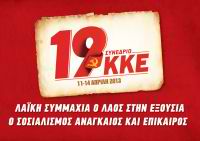Links to the old web pages of KKE
Statement on the death of the leader of the Cuban revolution, Fidel Castro

In its statement on the death of the leader of the Cuban revolution, Fidel Castro, the Central Committee of the KKE noted:
«The CC of the KKE, with great sadness, bids farewell to the legendary figure of the international communist movement, the leader of the Cuban revolution, Fidel Castro.
We express our most sincere condolences to the President of Cuba, Raul Castro, the CC of the CP of Cuba and to the entire Cuban people.
Fidel Castro was born in Birán, Cuba, on the 13th of August 1926 and studied law at Havana University. As a student he began to participate in the revolutionary movement against the Batista dictatorship in Cuba, a dictatorship which was also openly supported by the USA.
On the 26th of July 1953, he was the head of a group of revolutionaries that attacked the military barracks of Moncada, with the aim of encouraging the people of the island to rise up against the dictatorship. The attempt failed and he and his comrades were arrested, however the 26th of July marked the beginning of a great popular uprising against the dictatorial regime of Fulgencio Batista.
Faced by his accusers, on the 6th of October 1953, in the courtroom of Santiago in Cuba, Fidel Castro said: "I know that imprisonment will be harder for me than it has ever been for anyone, filled with cowardly threats and hideous cruelty. But I do not fear prison, as I do not fear the fury of the miserable tyrant who took the lives of 70 of my comrades. Condemn me. It does not matter. History will absolve me."
The court sentenced him to 15 years in prison.
On the 15th of May 1955, Castro was released and at the beginning of July he departed for Mexico, where he organized and militarily trained a group of revolutionaries, from whose ranks emerged all the great leaders of the Cuban Revolution, such as Camillo Cienfuegos, Juan Almeida and Ernesto Che Guevara.
The revolutionaries began their rebellion in the mountains of the Sierra Maestra and the revolutionary army that was formed was based on the systematic political-military preparation, which had been begun by the 26th of July Movement under F. Pais, the Popular Socialist Party, as the CP of Cuba had been named, and the Revolutionary Directory comprised of revolutionary students. It was based on that activity of organized forces in the cities, on the clandestine work developed by the communists in the workplaces, farmers and youth. This preparation of the working class and the other popular strata contributed decisively to the victorious outcome of the revolutionary struggle. These were also the main forces that were then united into the Integrated Revolutionary Organizations, which led to the reconstitution of the CP of Cuba in 1965.
On the 1st of January 1959, the people's guerilla army of Cuba entered Havana triumphantly, after the long struggle of the people of Cuba against the Batista dictatorship, which was supported by the USA. The Cuban Revolution demonstrated that imperialism is not invincible and immediately found the full support of the Soviet Union and the then socialist countries.
Two years and 4 months after the Revolution, the Cuban people, guided by its leadership and by Castro himself, repelled the invasion and landing of 1,400 mercenaries sent by the US government at the Bay of Pigs in Giron,.
At the large demonstration on the 16th of April 1961, at the funeral of those killed by the air raids (shortly before the landing of the CIA mercenaries), Fidel Castro for the first time declared the socialist character of the Revolution. For decades Fidel Castro as the President of Cuba and the head of the CP of Cuba, led the struggle of the people of the country to construct socialism, in the difficult conditions of imperialist aggressiveness and encirclement and particularly after the counterrevolution in the Soviet Union and the other socialist countries in 1989-1991.
Fidel Castro leaves a valuable legacy for the international communist movement and particularly for the Cuban people, in the struggle they are still waging today against the US embargo that continues and against all the efforts to undermine the socialist development path, efforts in which the USA and the EU are playing a leading role.
Fidel Castro will forever live on in the historical memory and collective consciousness of the peoples of the entire world, of the oppressed, in the struggle for the liberation of humanity from the exploitation of man by man, for the final victory, for socialism-communism.
Hasta la victoria siempre!»
26.11.2016







